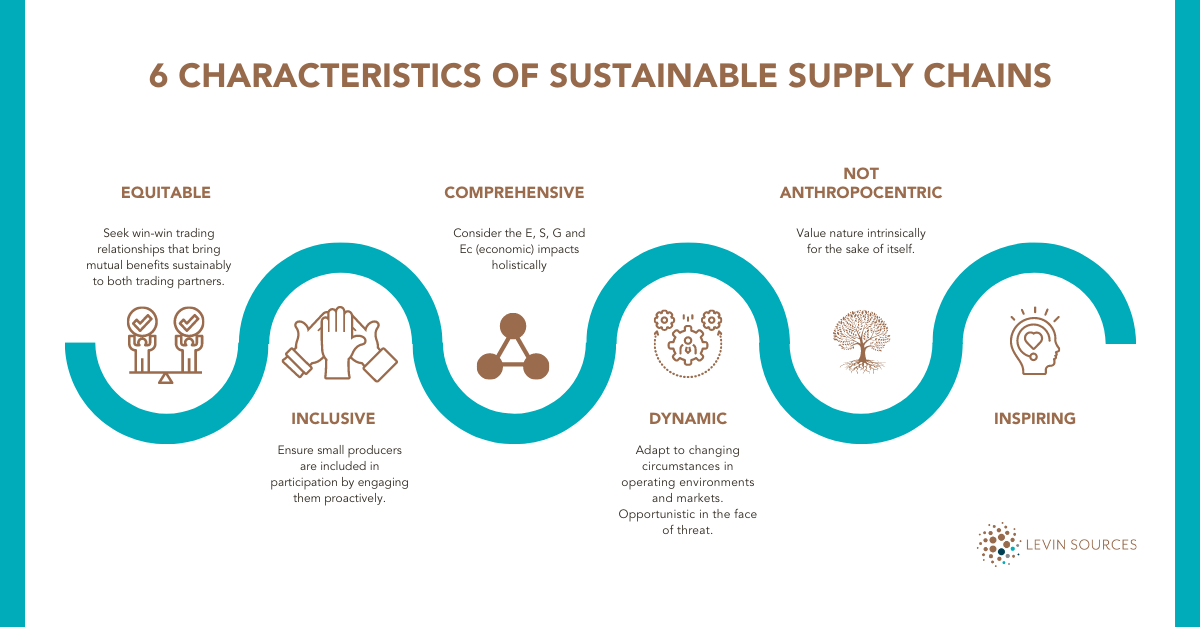There is so much going on in the Levin Sources universe on responsible sourcing: new European directives on corporate sustainability; handling Russian sanctions and Russian origin minerals; coming to terms with human rights due diligence as a driving logic of supply chain management.
But at Levin Sources, we don’t think about supply chains only in terms of avoiding harm and managing risks, we are squarely in the camp of opportunity maximisation.
Getting supply chains to be ‘ESG-ready’ or ‘risk-ready’ is fine and good, indeed it’s essential! But to make supply chains tools for potent beneficiation—particularly for small, marginalised, and vulnerable producers and stakeholders —well, that is transformative.
And that’s why we exist: to build sustainable, valuable, and equitable sectors and supply chains.
You see, when I think about supply chains, I think about impact. Massive impact. And if you’re not thinking the same, maybe we can inspire you here to start doing so.
Let me give you some recent examples:
- Last year, one in five U.K. retailers cancelled contracts with suppliers who had fallen short on ethical and sustainable standards. The price tag for these decisions? £7 billion ($9.1 billion USD);
- In a recent BBC Food Programme on eco-labelling, Nestlé noted that nearly two-thirds of its environmental footprint comes from its sourcing ingredients; and[2]
- A McKinsey study went further, illuminating the environmental impact of our global economy: the supply chain of a typical consumer company- food, beverage, retail - creates far greater social and environmental cost than its own operations. As much as 90 % of the typical consumer company’s impact on biodiversity, water, air, land, and geological resources come from the supply chain, and 80% of greenhouse-gas emissions.
Companies and consumers have never been so engaged.
We have an unprecedented opportunity to create positive impacts by focusing on supply chains, improving, and amplifying communication on our sustainability expectations, and holding suppliers to account.
But how do we maximise this opportunity?
In this blog series born from the below discussion with Monique Lempers of Fairphone, Mark Jankovich of Delphis Eco, and David Picton of Alcumus, we’ll highlight emerging examples, critical approaches, and opportunities for companies right now.
But to begin, the conversation should be grounded in what we mean by sustainable supply chains. We developed these principles to help applicants to the 2022 Global Good Awards Supply Chain Category consider their eligibility to apply, and to frame the webinar on sustainable supply chains we ran for the GGA in March.
In sustainable supply chains, companies:
- Respect human rights, for people today and tomorrow.
- Consider cultural as well as environmental heritage.
- Use their leverage to influence business partners and other stakeholders to make the changes necessary to make the chain more sustainable.
- Lead by example.
- Partner to drive for greater impact sooner.
- Are authentic, communicating on their activities
- Are fundamentally curious and innovative, seeking out issues and using their power to address them.
- Are transparent, with businesses clearly, promptly, and regularly reporting their Sustainability performance at the group, site, and product level to all stakeholders.
- Are truthful and thus trusted, able to disclose and learn from things when they go wrong or when there are surprises and committed to remedy.[4]

These principles are the grounding philosophy for the Global Good Awards Sustainable Supply Chains category and what this series will examine.
To learn more about how you can improve your supply chain and drive sustainable development through it, find us at: https://www.levinsources.com/






